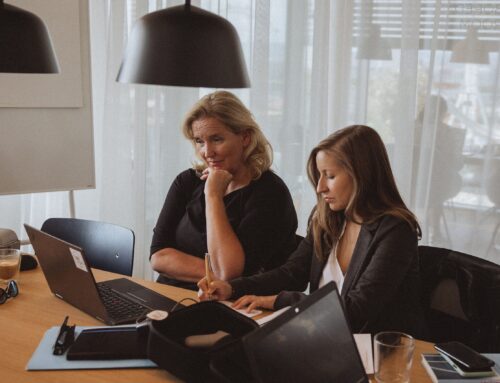What would have to happen to enable people to adapt quickly and willingly to changing working conditions?
What would all be possible if managers could create a working environment that would allow goals to be achieved effectively?
What if people could organize themselves so well and managers had so much time to address the individual challenges of their employees?
The Corona crisis has changed and turned many things in the working world upside down. The initial restrictions have made managers with more traditional or hierarchical management approaches look “old”. Loss of control and loss of power on the one hand, and loneliness and fears on the other hand, were the consequences.
Good got better, bad got worse.
And one thing became visible: managers who were able to adapt to the different needs and situations of their employees even before that and who lived an individualized situational leadership were rewarded in a lockdown! Or as DI Uwe Reiner-Kolouch provocatively put it in an online roundtable (organized by Jürgen Pfeiler corporate culture consulting at the end of June): “Everything that worked well before the crisis worked even better during the crisis. Everything that was already bad before, became even worse!”.
So why will we need even more individualization in leadership in the future?
When the ability to plan decreases, the familiar environment and processes change and proven processes and conditions suddenly disappear, people react more or less with impractical and negative behavioral patterns – so-called distress patterns. For example, many people in prescribed isolation have reacted with insecurity, boredom or even destructiveness. Others, on the other hand, seemed to enjoy the time – “Finally time to work in peace”, “Finally time to eat and chat in the family” and similarly positive messages were received.
What are the reasons for these different reactions?
The Process Communication Model® provides quick answers. According to the Process Communication Model®, there are people who, due to their personality structure, prefer to behave in a socially group-oriented manner or – quite the opposite – in a more secluded manner. Online meetings, which tend to be short and strictly according to agenda and with a minimum of social exchange and relationship management, are for some people “finally an efficient meeting without chatting” and for others “a social desert without an oasis”. Managers who took this into account and voluntarily allowed people to log in 15 minutes before the start of the meeting and simply reserved time for chatting, joking around and cultivating relationships, and then efficiently brought the agenda through, were able to score points with the entire team.
The different need for contact frequency and contact quality is particularly evident during this time! “In the future, we will have to live the topic of home office versus work in the office very differently and individually adapted,” says Jürgen Pfeiler, Managing Director of Corporate Culture Consulting.
Guarantee for success: Always make sure the batteries are full.
It is now well known that a person’s full potential can only be unfolded if he or she is in a good energy state or, as PCM puts it, “has full batteries”. Managers who can make a positive contribution to this – for themselves and others – will be much more successful in crisis situations. But this also means being able to get involved in the (other) being of the other person! If I know that my colleague likes to joke around or describes a funny incident with a customer at the beginning of a meeting, then as a manager I just need to give him some space. The colleague “charges his batteries” in this way and is then much more efficient when it comes to analyzing the monthly report, for example. People who need more time and rest will enjoy their home office, provided they have a clear mission and objectives. Then they are more likely to reward the environment with promising new solutions!
But can individual leadership be learned?
Uwe Reiner-Kolouch likes to compare it to riding a motorcycle on challenging routes: “Yes, there are natural talents. In the end, many of them are just as good at it after they have learned the appropriate techniques and, above all, practiced them”. In the book “TOOLBOX FÜHRUNGSKOMPETENZ” he and his colleagues from IMC collected numerous management techniques and communication tools such as PCM and presented them in a practice-oriented manner with many examples.
Uwe Reiner-Kolouch presents three conditions for individual leadership in the context of the Round Table:
- being able to lead oneself – 20 years of leadership experience is not equal to 20 years of reflected leadership experience to question oneself again and again, to leave one’s own comfort zone and to try out new behaviors are the key to success.
- find and create meaning – managers who find meaning in their leadership work and create meaning in their work for their employees are rewarded with motivation.
- with the team to the meta-level – Individual leadership also means to ask the question again and again in the team: “What contribution can I (still) make so that each individual can be successful?
If you would like to learn more practical tips and tools on the topic of “Individual Leadership”, then take a look at our book “TOOLBOX FÜHRUNGSKOMPETENZ – People Management in der Praxis” (here you can find a reading sample: https://imc.or.at/news/buch-toolbox-fuehrungskompetenz).
Here you can listen to & look up the entire interview. Have fun!

Uwe Reiner-Kolouch ist Geschäftsführer von Kahler Communication – KCG GmbH, Gründer des österreichischen Berater- & Trainernetzwerks IMC – integrality® management consulting e.U. (imc.or.at), Unternehmensberater, Coach und Trainer, Sparringpartner, Lebens- und Sozialberater, Ausbildungstrainer im Process Communication Model® (PCM) und Organisations- und Personalentwickler und begeisterter Motorradfahrer (BMW GS Enduro).






